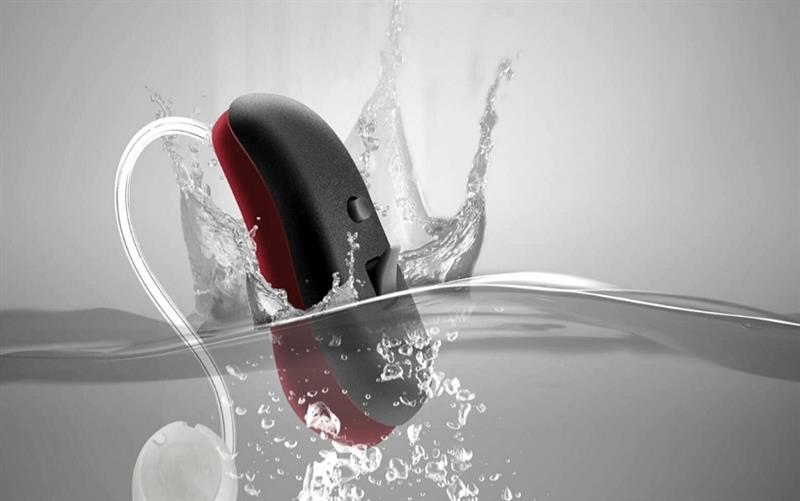
Hearing aids that are waterproof are made to resist submersion in water, including rain, perspiration, and swimming. Waterproof hearing aids minimize the chance of damage or malfunction from moisture or dust, make it easier to use them in a variety of environments, and let you take part in water-based activities without worrying about damaging your hearing.
Most waterproof hearing aids are water-resistant rather than completely waterproof. This indicates that while they cannot withstand total submersion for prolonged periods of time, they may withstand minor water incursion. From 0 to 681, the ingress protection (IP) rating indicates the degree of water resistance. The device is more water-resistant the higher its IP rating.
Depending on your needs and tastes, there are a variety of kinds and brands of waterproof hearing aids available. Rechargeable batteries, Bluetooth connectivity, noise reduction, and a microphone, amplifier, and speaker are all included in the same technology and listening experience as traditional hearing aids.
How to Handle Waterproof Earphones
Whether your hearing aids are water-resistant or waterproof, we don't advise using them for prolonged periods of time when testing them out. While waterproof hearing aids with an IPX certification should theoretically offer some protection, these tests are conducted in perfect laboratory settings using filtered water. Try to replicate these tests in the ocean or pool, and you may introduce particles and toxins into the water and damage your hearing aid.
There are a few things you can do to make your water-resistant or waterproof hearing aids last longer. More rapid removal of moisture and water can be achieved by taking out the batteries, cleaning the device with a clean towel, and letting it air dry. An UV clean and dry box that gently removes moisture and condensation with heat can be used for quicker results. Additionally, sweatbands, covers, and shields can stop water from ever getting inside the hearing aid.
Are Waterproof Hearing Aids Necessary?
- You may be drawn to water-resistant or waterproof hearing aids for a number of reasons:
- You engage in a variety of water sports, such as sailing, kayaking, swimming, and water skiing.
- You either reside near a sizable body of water or in an area with an extremely humid or wet climate.
- If you have a condition like hyperhidrosis, which results in excessive perspiration, you should use your hearing aids during intense exercise.
- You are concerned that water or other liquids—dropping them in a puddle or wearing them in the shower, for example—may accidentally break or destroy your hearing aids.
Can Waterproof Hearing Aids Be Worn Swimming?
It is advisable to take off hearing aids before diving, even if they have an IP68 designation. According to regulated laboratory testing, IP68 indicates that it can withstand submersion in up to 30 meters of water for up to 30 minutes. As a result, dry hearing aids are more effective and durable.
Even if your hearing aids are waterproof, develop the practice of taking care of them. Dry them after use, store them in a secure case, and cover them with cloth when they're in an area that gets humid, like during an exercise.
The Advantages of Waterproof Earbuds
The primary advantage of waterproof hearing aids is its ability to enable you to participate in activities that were previously unattainable. You no longer have to be concerned about breaking your hearing aids or being without them when you enjoy taking laps in the pool, playing sports like water polo, or just relaxing in the tub.
In addition to increasing your sense of security, waterproof hearing aids are very beneficial if you are prone to mishaps or unplanned moisture exposure.
1. Technological Progress:
Technology for hearing aids has advanced significantly with the introduction of waterproof models. These water-resistant devices enable users to interact with their environment to the fullest, especially in difficult or damp situations.
2. Weather Hardiness:
Travelers frequently find themselves in a variety of climates. Travelers may comfortably navigate through rain, snow, or humid settings with waterproof hearing machines without worrying about harming their indispensable devices.
3. Activities in Water:
Waterproof hearing aids are a game-changer for locations with stunning lakes, beaches, or water-related activities. Travelers don't need to take off their hearing aids to enjoy swimming, water sports, or just relaxing by the water.
4. Improved Investigations:
Water features are present in many tourist sites, such as tranquil boat cruises and magnificent waterfalls. People who have hearing loss can take part in and enjoy these experiences to the fullest extent possible thanks to waterproof ear devices.
5. Sweat and Humidity:
Conventional hearing aids can become wet from walking through humid areas or exploring bustling markets. Waterproof hearing aids are a dependable solution that give uninterrupted hearing in a variety of environments and peace of mind.
6. Unpredictable Weather:
Unexpected weather changes frequently occur when making travel preparations. With waterproof hearing aids, tourists can confidently adapt to the elements, knowing that their hearing devices are designed to withstand rain, sudden downpours, or even accidental splashes.
It's ideal to keep yourself as educated with your hearing aids and a new breakthrough in the technology. Ask your query via Book an Appointment today. For more information visit https://hearing.careinc.ca or you can call us today at (403)605-6300